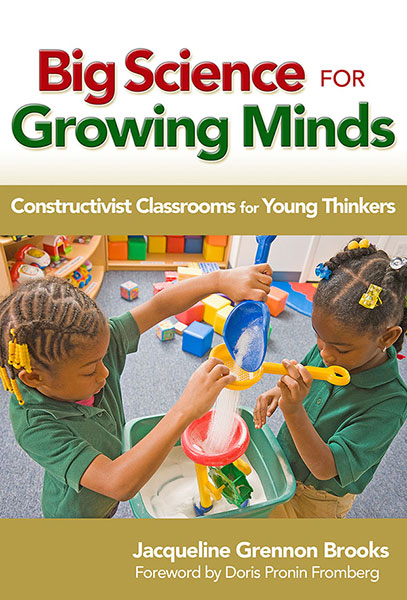Professors: Request an Exam Copy
Print copies available for US orders only. For orders outside the US, see our international distributors.
Publication Date: June 10, 2011
Pages: 192
Series: Early Childhood Education Series

Strong evidence from recent brain research shows that the intentional teaching of science is crucial in early childhood. Big Science for Growing Minds describes a groundbreaking curriculum that invites readers to rethink science education through a set of unifying concepts or “big ideas.” Using an integrated learning approach, the author shows teachers how to use readily available, low-cost items to create a safe classroom setting that fosters hands-on learning and exploration of real-life problems. The text includes classroom activities that connect science learning to mathematics, technology, art, and literacy.
Book Features:
Jacqueline Grennon Brooks is professor of science education in the Department of Teaching, Literacy, and Leadership at Hofstra University in Hempstead, New York.
“Offers an innovative approach for teachers who are serious about helping children cultivate knowledge about their world through science.”
—Young Children
“An outstanding guide that makes a strong case for the importance of science education in the early grades.”
—Connect
“A much-needed book that provides valuable theoretical and practical information for all science educators.”
—NSTA Recommends
“A wonderful, jam-packed storehouse of research-based ideas for the effective teaching of science.”
—Lawrence Lowery, University of California at Berkeley
“Constructivist practice comes to life in these pages. At a time of narrow high-stakes tests, here is a model that preserves truly professional practice.”
—From the Foreword by Doris Pronin Fromberg, Hofstra University
Foreword by Doris Pronin Fromberg
Acknowledgments
Introduction
PART 1: SCIENCE IN EARLY CHILDHOOD
Chapter 1. Young Scientists with Growing Ideas
Children Grow Up by Growing Ideas
Children Grow Smart by Growing Ideas
Constructivist Classrooms
Professional Knowledge Standards
Technology for Young Citizens
The Importance of Simple
Spaces for Growing Ideas
National Science Education Standards
A Simple Message
Chapter 2. A Constructivist View of Learning
Building Big Ideas
Problems of Emerging Relevance
Points of View
Tie Teaching to Assessment
The Pursuit of Making Sense
Deliver Opportunities, Not Concepts
How We Learn Determines What We Learn
Can Classrooms Really Work That Way?
Chapter 3. Learning to Care and Caring to Learn
Teach–Assess–Reflect Cycle
Good Curriculum, Good Behavior
When Good Curriculum Is Not Enough
Assessment Within Teaching
Errors Lead to Truths
The Productivity of Wrong Answers
Structured Reflection
Becoming a Master Learner
Reflection in Steps
Ever a Learner
PART 2: LANDSCAPES FOR LEARNING SCIENCE
Chapter 4. Science as Disciplined Wonder
Amazing Ideas Begin with Wondering
Wondering Within the Curriculum
Classifying: What Not to Do
Classifying: Another Try
Classifying: Inventive Perspectives
Classroom Structure
From Procedures to Concepts
Artful Guidance
Teacher as Provocateur
Chapter 5. Science Learning Within Family, Community, and Nature
Laboratories Everywhere
Childhood Physics: A Cargo-Crossing Challenge
Learning in Nature
Mindful Engagement
A Lesson as a Journey
Chapter 6. Science of Learning
Children’s Emerging Capacities
New Questions About Old Ideas
Two Sides of Learning
Mental Structures
Reflective Abstraction and Theory of Mind
Learning That Transfers
Neuroscience Research
Classroom Research
Chapter 7. Liberty and Science for All
Spaces of Liberty
The Richness of Differences
Children with Limited English Proficiency
Children with Special Needs
Collaborative Settings
The Learning Context
Chapter 8. Negotiating the Science Curriculum
Meaningful Curriculum
Designing Better Science Lessons
Thinking with Children, Not for Children
Animals That Live in the Cold: An Example Unit
Understanding Content and Cognition
PART 3: FROM UNIFYING SCIENCE CONCEPTS TO CURRICULUM
Chapter 9. Unifying Science Concepts
A New Perspective on Teaching Science
The Search for Patterns
Topics, Concepts, and Key Ideas
Simple and Complex All at Once
Learning from Some Great Scientists
Collective Scientific Thinking
Chapter 10. Unifying Concepts: The Physical Environment
Relate Form and Function
Look at Whole Systems and Their Order and Organization
Examine Equilibrium and Evolution
Make Models, Collect Evidence, and Offer Explanations
Measure What Changes and What Stays Constant
Planning a Lesson Using Unifying Concepts
Water Studies: A Physics Unit
Chapter 11. Unifying Concepts: The Living Environment
Relate Form and Function
Look at Whole Systems and Their Order and Organization
Examine Equilibrium and Evolution
Make Models, Collect Evidence, and Offer Explanations
Measure What Changes and What Stays Constant
Plant Growth: A Biology Unit
PART 4: FROM CURRICULUM TO THE WONDER OF SCIENCE
Chapter 12. Science in the Shopping Cart: A Chemistry Unit
Clean-Up Time
Color Without Crayons
Shake It Up
Sticking Together
Cover with Crackers
Chapter 13. Water, Soil, Sand, and Salt: An Earth Science Unit
At Water’s Edge
Squeaky-Clean Water
Fruits in a Flood
Waterwheels at Work
Sand from Shore and Store
Chapter 14. Putting It All Together
The Classroom as Laboratory
"Verbs" for Learning Science
Lesson Plan Model
Becoming a Professional
Conflicting Messages
A Simple Message
References
Index
About the Author
Professors: Request an Exam Copy
Print copies available for US orders only. For orders outside the US, see our international distributors.